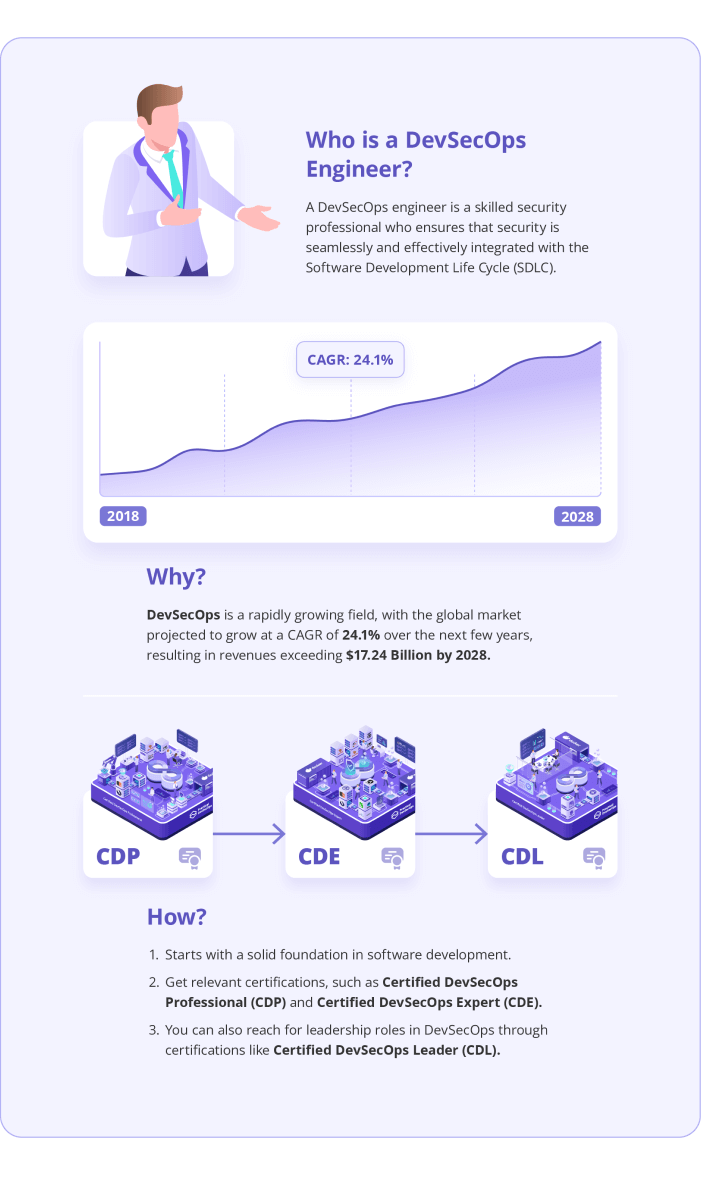DevSecOps, a rising field, has the spotlight on a security philosophy integrated along the application lifecycle, ensuring better and more secure code that can be delivered faster. Due to this, companies increasingly recruit skilled DevSecOps engineers to their teams. In this write-up, we will explain the career path that DevSecOps holds for the future and how one can become a skilled DevSecOps engineer, providing future insight into the domain for aspiring and current IT security professionals.

What is a DevSecOps Engineer?
A DevSecOps Engineer is a security professional responsible for ensuring comprehensive and effective integration by the security team within the Software Development Life Cycle (SDLC). The task is, therefore, to find the possible vulnerabilities that security might have: either a technique or a strategy to mitigate the possible risks, in order for the risks of those vulnerabilities not to materialize.
The DevSecOps engineers are among those who look for, apply security controls to, and assure that the work done conforms to the appropriate high security standards and regulations. He is, in other words, the most important professional who makes sure the security is upfront of the SDLC.
Introduction to DevSecOps Career Path
DevOps is a practical approach for delivering reliable software quickly, but security is often left as an afterthought. DevSecOps integrates security as an essential component of the SDLC, distributing security responsibilities amongst team members and encouraging a “Security as Code” culture.
The DevSecOps Career Path
DevSecOps is a professional career that starts from software development. Most of the engineers in the DevSecOps field started in software development (or) system administration, then later these professionals would be transitioned into DevSecOps. Another related certification is Certified DevSecOps Professional (CDP) & Certified DevSecOps Expert (CDE). If you’re someone who is looking for a high leadership level certification in DevSecOps then you can take Certified DevSecOps Leader certification (CDL).
Here is a brief overview of the DevSecOps Career Path
DevSecOps Engineer Skills
To become a pro-DevSecOps engineer in 2024, aspiring individuals must have different technical and soft skills in combination. Right below, we have listed out the best DevSecOps Engineer skills that are required:
- Strong understanding of security concepts, including threat modeling, risk assessment, and vulnerability management.
- Knowledge of the SDLC and experience integrating security best practices at every process stage.
- Familiarity with automation tools and scripting languages like Python and PowerShell.
- Understanding cloud security principles, including secure architecture design and configuration management.
- Knowledge of container security principles, such as Docker and Kubernetes.
- Experience with DevOps practices, such as continuous integration and delivery (CI/CD) and infrastructure as code (IaC).
- Experience with various compliance frameworks and regulations: PCI-DSS, HIPAA, and GDPR.
- Good analytical problem-solving skills to scrutinize and solve very intricate security problems with effective solutions.
- Ability to work cohesively with cross-functional teams and possess good communication skills.
- Passionate about continued learning and being aware of current security trends and technologies.
DevSecOps Engineer Roles and Responsibilities
DevSecOps engineer roles and responsibilities are various tasks, including:
- Integrating security features in the software development life cycle.
- Identification and probable security risks, with their mitigating strategies.
- Implementation of security controls.
- Monitoring of the threat to security.
- Ensuring regulatory compliances for standards of security.
- Proficient in uniting cross-functional teams and communicating clearly, while fervently pursuing knowledge of the latest trends and technologies in security.
DevSecOps Engineer Requirements
DevSecOps engineer requirements are several, and some of them are as follows:
- Early detection of security vulnerabilities
- Faster deployment of secure software
- Enhanced collaboration among development, security, security, and operations teams.
- By following better compliance with security standards and regulations
- Greater visibility into security risks and threats
How to Become a DevSecOps Engineer?
To be a DevSecOps Engineer, one should have a strong basis in software development and principles of security. For example, some would be computer science, information technology, or any other degree-related stream from a relevant field. The same would stand you in good stead, for example, certifications like Certified DevSecOps Professional (CDP) in the area of shows off your security knowledge.
Also read, Best DevSecOps Books
Learning Resources for DevSecOps
Several resources are available for anyone interested in learning more about DevSecOps.The right DevSecOps Career Path to Becoming a Skilled DevSecOps engineer includes the aspiring individual equipping himself with essential tools.
Here are the resources you can use to pave your way to becoming a DevSecOps engineer, Namely:
- Git (Version Control System)
- CI/CD ( Continuous Integration and Delivery)
- Artifact management
- Infrastructure as Code(Configuration management tools)
- Cloud Platforms (AWS, GCP, or Azure)
Do not feel overwhelmed! Initially, you only have to build a basic understanding of these tools.
Here is the link to the List of Videos, Tutorials, Blogs, Hands-on labs, or Online playgrounds you can use to pave your way to becoming a DevSecOps Engineer.
DevSecOps Tools and Technologies
DevSecOps engineers will be armed with a large variety of tools and technologies that they will apply to their work. They typically work within an environment that is supported by automated testing tools in the case of potential security vulnerability areas. Below is a list of Top 6 best tools and technologies used by DevSecOps professionals are:
- Jenkins
- GitLab
- Docker
- Kubernetes
- Ansible
- Terraform
Also Read, Best DevSecOps Tools in 2023
What Does a DevSecOps Engineer Do?
- DevSecOps engineers are required to be capable of efficiently implementing a range of DevSecOps best practices, including:
- Build in security early and often within the SDLC, so each of the phases identifies and mitigates the risks in the process.
- Cultivate a security culture within the organization: every stakeholder should know their responsibilities.
- The idea is that you should automate everything in the security testing and deployment process that you can possibly automate, as more likely to be driven by human error.
- Take a security risk-based approach, focusing on all important but most critical assets and vulnerabilities.
- To leverage IaC (infrastructure as a code) in a more consistent and efficient way to put up secure environments.
- Security is to be regularly assessed, and penetration testing should help in identifying any exposure for the improvement of security posture.
- Help in sharing knowledge and best practices between the security, development, and operation teams to achieve true collaboration. Monitor the environment from any security threat and respond promptly to incidents or breaches.
- Utilize a security-centric DevOps toolchain to integrate security testing, deployment, and processes smoothly.
- Integration of security into the SDLC will ensure developed software complies with some security standards and regulations, for example, PCI-DSS, HIPAA, GDPR, etc.
Also Read, Must Know DevSecOps Engineer Interview Questions
Challenges Faced by DevSecOps Engineers
DevSecOps engineers face several challenges, including
- Keep up with new security threats and vulnerabilities.
- Balancing security against development pace while ensuring compliance with the standard and regulation.
- Work harmoniously with developers and other stakeholders to manage complexity in cloud environments.
DevSecOps Engineer- Frequently Asked Questions
What is the difference between a DevOps engineer and a DevSecOps engineer?
A DevOps engineer focuses on integrating development, operations, and quality assurance processes, while a DevSecOps engineer incorporates security practices into the DevOps workflow.
What is the difference between a cybersecurity engineer and a DevSecOps engineer?
A cybersecurity engineer protects systems and responds to threats, whereas a DevSecOps engineer integrates security into the software development process, ensuring secure application delivery.
Is DevSecOps a good career, and is it in demand?
Yes, DevSecOps does make a promising career. But, hand in hand, with the increasing demand for secure software, the number of jobs is also increasing, which focuses on professionals who can deliver a balance between development, operations, and security.
What is the goal of a DevSecOps engineer?
The aim of a DevSecOps engineer is to inculcate security in the process: safe coding practices and the most important cultural change to the culture of security awareness and working with collaboration.
What is a Certified DevSecOps Engineer?
Certified DevSecOps Engineer is an experienced person who will be responsible for integrating the industry best security practice into DevOps pipelines. They are able to perform secure coding practices, security testing, and risk assessment to enable the betterment of enterprise security posture.
Conclusion
DevSecOps is one of the fundamental practices for organizations running software applications. However, being a good DevSecOps engineer would mean understanding the basic principles of software development and security. As you knew, in the DevSecOps world, we need to keep continuous learning about emerging technologies and getting to know the latest security threats in the current market.
The DevSecOps field is projected to experience rapid growth, with revenues exceeding $17.24 Billion by 2028!
Practical DevSecOps offers an excellent Certified DevSecOps Professional (CDP) course with hands-on training through browser-based labs, 24/7 instructor support, and the best learning resources to up skill in DevSecOps.
Start your journey towards becoming a skilled DevSecOps engineer with Practical DevSecOps!







0 Comments